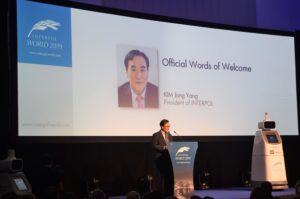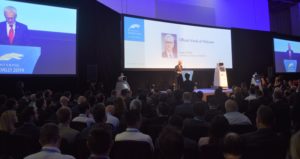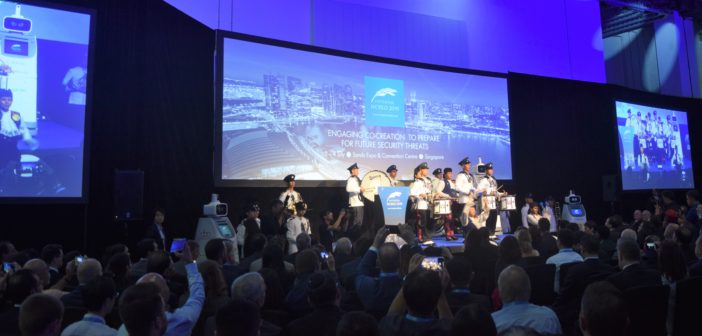
Attending INTERPOL World in Singapore last week as Media Partners, it was clear at the outset that this event is a needed opportunity to maintain a strong focus on ‘thought leadership’ pertaining to international law enforcement. PODCAST SERIES NOW AVAILABLE HERE

President of INTERPOL, KIM Jong Jang
With 194 country membership and 82 countries represented, INTERPOL World consisted of 32 labs exploring how law enforcement should face contemporary challenges. The three-day event managed four working groups; Chief Innovation Officers Group, Darknet and Cryptocurrency, Drone Expert Forum and Artificial Intelligence (AI) for Law Enforcement.
With a brief announcement by a OneBerry Robot, President of INTERPOL, KIM Jong Jang opened the event with an emphasis on societal trends impacting the policing role, highlighting social media, terrorism, illicit funding, cybercrime and how policing worldwide is grappling with preparing for a future yet unknown, asking; “Are we ready and are we ready for the next disruption?”

Jurgen Stock, Secretary General of INTERPOL
Jurgen Stock, Secretary General of INTERPOL emphasised that even annual predictions are failing to keep up with the pace of change. The required reaction time to trends is plummeting and reaction itself is no longer enough. He said, “We must see, anticipate and prepare. No single police force or country will ever face a challenge alone.” Responding to emerging threats, including malicious use of robots and drones, Stock closed with stating the three key areas needing to be addressed is the speed of legislative response, overcoming jurisdictional boundaries and building trust.

Mrs Josephine TEO, Singapore’s Minister for Manpower and Second Minister for Home Affairs
Mrs Josephine TEO, Singapore’s Minister for Manpower and Second Minister for Home Affairs briefed the opening ceremony on Changi Airport’s anticipated growth from 220,000 passengers per day to 500,000 passengers. The Government has plans to implement a ‘contactless clearance system’ involving biometrics for ‘iris and facial’ scanning. This is part of a three-tier strategy to rapidly solve crime through technologies via biometrics, data analytics and digital forensics.
The amount of data, despite often being of low quality, provides strong insight and ultimately the possibility of predictive policing. A Dutch ‘City Pulse Project’ is monitoring the tones of people’s voices to highlight potential trouble spots. Similar in application to gunshot sensors being used in the United States.
Policing has leaped into the digital frontier and tapping into extracting data in digital devices is now the next challenge. Police will need to ensure evidence can be captured before criminals destroy digital evidence or use it to hide their identity, acknowledging criminals are always looking for the next exploit. INTERPOL has worked closely with the United Nations Inter-regional Crime and Justice Research Institute (UNICRI) on the joint “Artificial Intelligence and Robotics for Law Enforcement” report, which describes new threats related to their malicious use.
INTERPOL is also in the process of creating a Drone Response and Forensic Guidelines, which will offer police and other first responders’ standard procedures for handling this type of technology to preserve and source evidence, and minimise harm.
One leading project by Singapore Police is SkyARC, or Sky Aerial Response Command, exploring autonomous technologies with drones and robotics and a concept which will operationalise drones (UAVs) to be the first police vehicle to arrive on the scene.
Mrs Teo said, “Crime and terrorism are increasingly borderless and inventive. If we are to win this fight, we must support each other and become better together. Among other things, this would involve law enforcement agencies sharing information much more quickly and pooling resources to coordinate transnational responses.”
The ASEAN Cyber Capability Desk (the ASEAN Desk) within the INTERPOL Global Complex for Innovation (IGCI) was officially launched in July 2018. Currently staffed by seconded officers from Brunei and Singapore, the ASEAN Desk drives ASEAN-centric operations to build capacity and enhance threat-related intelligence on cybercrime. Singapore also supports the INTERPOL’s Regional Counter-Terrorism Node initiative (RCTN) with a seconded officer to the RCTN Asia and South Pacific, also housed in the IGCI.
2nd Australian Delegation Luncheon

2nd Australian Delegation Luncheon -INTERPOL World VIP Lounge
MySecurity Media and INTERPOL World hosted the 2nd Australian Delegation Luncheon as a successful networking opportunity and also to share Australia’s efforts in combating cybercrime and coordinate a tour of the INTERPOL World Exhibition showcase. Doug Witschi, Assistant Director, Strategic Innovation, INTERPOL and Superintendent Brad Marden, Australian Federal Police provided presentations on each other’s roles and the Australian law enforcement frameworks for cybercrime.
Thanks again to INTERPOL and the INTERPOL World team for assisting with organising the event with us and to Kaspersky and BeyondTrust for supporting the event.
Stay tuned for the INTERPOL World 2019 podcast series now in production with the following interviews:
- Mr. Walter Lee, Evangelist & Government Relations Leader, Global Safety Division, NEC Corporation – discussing biometrics and data anlytics
- Dr John Coyne, Senior Analyst, Australian Strategic Policy Institute – discussing law enforcement trends, particularly to financial crimes
- Mr. Anton Shingarev, VP for Public Affairs, Kaspersky – discussing public-private partnerships and Kaspersky’s 5 year strategic partnership with INTERPOL
- Ms. Brooke Tapsall, CEO of DroneALERT – discussing drones and drone reporting systems
- Mr. Fuji Foo, VP of Business Digitalisation, Certis CISCO Singapore – discussing the Certis Centre for Applied Intelligence, a Security Operations Research Hub, launched separately to the event (not associated with INTERPOL World)
by Chris Cubbage, Executive Editor
CYBER RISK LEADERS & MEETUPS
SINGAPORE
15 August – Cyber Risk Leaders – BeyondTrust Privileged Access Forum, Four Points by Sheraton, Singapore
MELBOURNE & SYDNEY
7 August Melbourne – Menlo Transform & Change Forum with Senior AFL Coach Rodney Eade
8 August Sydney – Menlo Transform & Change Forum with World Champion Athlete Jana Pittman
24 August Melbourne – Cyber Risk Leaders – BeyondTrust Privileged Access Forum, Grand Hyatt






